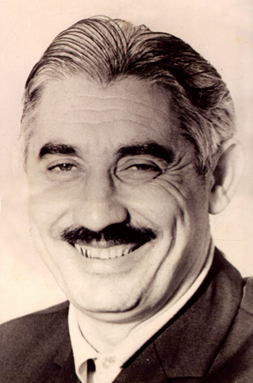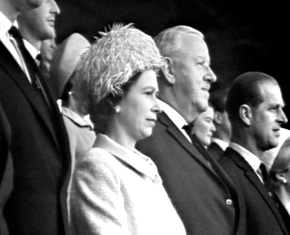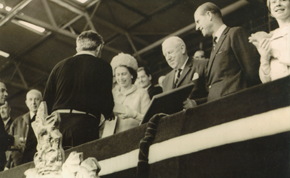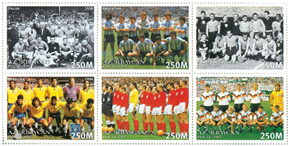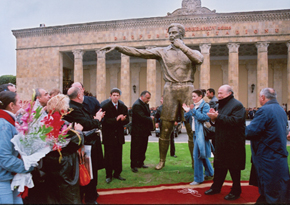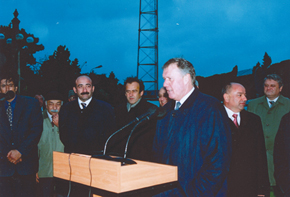Tofiq Bahramov’s statue was unveiled before the Azerbaijan-England World Cup qualifier in Baku’s Republic Stadium on 13 October 2004. Members of the Azerbaijani community, trainers, footballers and fans spoke about Tofiq Bahramov’s contribution to football. Geoff Hurst, the England striker who scored three goals against West Germany in the 1966 World Cup Final, made a speech at the ceremony. And FIFA President Josef Blatter laid a wreath as a sign of respect.
WHO IS TOFIQ BAHRAMOV? WHY IS FIFA GRATEFUL TO HIM? WHAT LINKS HURST AND BAHRAMOV?
You’ll find answers to these questions below.Forty years have passed since the eighth World Cup Final, between England and West Germany, on 30 July 1966. An event occurred that day that has been the subject of controversy ever since. What happened?
One episode in the match has lived in the memory of football fans for 40 years: in the black and white TV pictures of the time a team in white has conceded a goal; the players in black (in fact their strip was red) have joyfully raised their hands in celebration; two defenders in white – the number 2 and his team mate on the goal line - and the keeper in black are looking in surprise at the left wing, the linesman standing by the corner flag appears to have given the team in black no reason to celebrate. It’s up to the linesman to assess the situation: if the referee himself isn’t sure, then he will be guided by the linesman and will either point to the centre spot, to show that a goal has been scored, or will tell the goalkeeper to restart the game with a goal kick.
There are two choices. There’s no third option!
As the memory of this episode lives on, the ball, the referee and the linesman are in the background. But we fans with our 40 years of experience know what happens next: Gottfried Dienst, the Swiss match referee, will run over to Tofiq Bahramov, his assistant from the USSR, and ask "Was it a goal?" The linesman, orange flag in hand, will say "Yes!" and point decisively to the centre spot. The referee will agree with him and Hurst’s goal in the 10th minute of extra time or the 100th minute of the match, will stand. The complaints of the Germans, who were in white, will be to no avail. The 2-2 on the scoreboard, in a stadium packed with 96,924 fans, will change to 2-3. And after another 20 minutes Geoff Hurst will score another goal (his third in the match, a record that has not yet been broken in a World Cup Final) and the England team win 4-2 and lift the Jules Rimet trophy, the Golden Goddess Nike. And with that the latest World Cup will enter history. But the arguments and discussions about that 100th minute goal in the England-West Germany match have gone on for many years and will do so for many more.
BUT WHY? WHAT IS THE REASON FOR THE DOUBTS AND ARGUMENTS?
Tofiq Bahramov writes in his book 1001 Matches, published in both Azerbaijani and Russian in 1967 in Baku:"In the first minutes of extra time the British made their opponents defend. Tilkowski’s (the West German goalkeeper’s - S. Y.) goalposts were shaking from the shots. He caught two difficult balls, one after the other. After the third shot the ball touched the bar, the fourth shot touched someone’s leg and bounced back, the fifth shot just passed the post...
"Then Hurst, running with the ball, cut through the penalty area, and when he reached the edge of the six-yard box he turned and hit his shot.
"Yes, I was carefully watching the trajectory of the ball. Tilkowski with his hands up was confused. THE BALL WENT IN UNDER THE CROSSBAR AND TOUCHED THE WHITE NYLON NET. The broad-shouldered Hurst in his red shirt stood rooted to the spot. I was so involved in this sight that I gave no thought to the ball TOUCHING THE GROUND AND BOUNCING OUT or to the German defender who headed the ball away from the goal (capitals and boldface are mine throughout - S.Y.)
"Goal?
"When Dienst came up to me and asked this question in his brisk voice, it seemed to me that all the stands could hear, as silence had enveloped Wembley.
"I confidently pointed the flag to the centre spot. In a second the silence turned into unimaginable uproar..."
The quotation could be stopped here, but it would not be enough to give a clear picture. So, after the match, after listening to the grateful words of Her Majesty the Queen from the royal box, after receiving Golden Nike from her hands, let’s listen to some more comment by linesman Tofiq Bahramov himself on what happened in the 100th minute of the match.
The Queen presents Bahramov with the Golden Nike award, 1966 "As soon as we had gone down the tunnel, we headed straight for the referees’ room. Sensing our excitement, they had switched the TV set on: as is the English habit, they were replaying the goals and the tensest moments of the final. Here was the unlucky third goal. TV technology allowed us to watch the incident in slow motion. The German goalkeeper slowly raises his hands and Hurst’s shot, which in the game flew like a cannon-ball, here moves slowly towards the goal, and THE NYLON NET TREMBLES SLIGHLY FROM THE SHOT.
"Yes. No doubt it was a goal!
"Coming up to my chair, Dienst shook my hand warmly and said hoarsely: ’Mr Bahramov, you saved my reputation. Thank you.’
"And I could not stop myself from saying: ’A goal! The ball is in.’...
"During the final reception
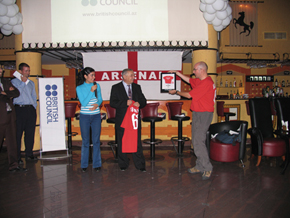
Fan-Friendly Forum presents T-shirt to Bahram Bahramov,
Tofiq Bahramov’s son in memory of his father, 2004
"’Accept my apologies, Mr Bahramov. I was wrong to argue with you on the pitch. We have watched the recording: IT WAS THE RIGHT DECISION TO GIVE A GOAL...’"
I had a purpose in highlighting the various excerpts from Tofiq Bahramov’s account: the reason is that those who doubt Hurst’s goal say that THE BALL DIDN’T CROSS THE GOAL LINE; they suppose that if the ball had crossed the GOAL LINE, then it would have been possible to have given the goal. But in his memoirs written after the World Cup the linesman didn’t say a single word about this subject, on the contrary, he notes every time that THE BALL TOUCHED THE NYLON NET UNDER THE CROSS BAR, CAUSING IT TO BULGE, in other words, that the ball was inside the goal, that it entered the goal. And this is a sure argument that it should be considered a goal!
Modern computer technology provides a basis for this argument. In 1998 Israeli company Orad worked out a VIRTUAL REPLAY programme that allows any incident from a game to be reviewed from all kinds of angles and this also confirmed that "the ball was in!" In other words, there was a goal. So linesman Tofiq Bahramov was not wrong!
A SPORTING LIFE
Tofiq Bahramov was born on 29 January 1925 in Baku. He played football for Baku teams Spartak, Dinamo and Neftchi from 1943 until the 1950s. After a serious injury in training he had to end Postage stamps issued in the memory of Tofiq Bahramov his 25-year professional football career. A chance event determined his future. In the spring of 1951 Dinamo and Iashechi youth teams were to play for the Baku Cup, the appointed referee did not turn up on time and Tofiq was asked to referee the match.As he acknowledged, the game ended in conflict and the fans were not happy with the referee. However, after just six months he was already refereeing Azerbaijani football premiership games and in 1952 became a linesman in the USSR Championship, and the same year was given the rank of a republican-level referee.
In 1954 he refereed his first Group B match (League Two) in the USSR Championship between the army teams of Tbilisi and Tashkent. The same year he refereed a friendly between the Ethiopian national team and Neftchi in Baku. In 1958 Tofiq Bahramov refereed a League One match in the USSR Championship between two of the top teams OMIK (Moscow) and Labour Resources (St Petersburg).
Over the years Tofiq Bahramov refereed the biggest games - cup finals and derby matches between the Dinamo teams of Kiev, Tbilisi and Moscow and Spartak. In December 1970 Moscow Dinamo and and OMIK (Central Army Sports Club) played a "golden match", or play-off, to decide who was the winner of the USSR Championship. And one game was not enough to determine the winner - as the first match ended in a nil-nil draw, a replay was needed. Tofiq Bahramov was the man in the middle for both "golden matches", unique in the history of the USSR Championship.
On 25 May 1971, at Lev Yashin’s personal request, Tofiq Bahramov refereed the legendary goalkeeper’s farewell match in Moscow between a Soviet Dinamo 11 and a FIFA select 11. Overall from 1958 to 1975 Tofiq Bahramov refereed 146 matches in the USSR’s first league alone and 13 years running featured in the Top Ten Referees of the Year List, which was unprecedented in Soviet football history.
In 1965 he was granted the rank of FIFA referee (in those days this rank applied for life, unlike today) and the England v West Germany game was far from Tofiq Bahramov’s only international match. During the 1966 World Cup he refereed Spain v Sweden, and ran the line for England v Uruguay and Argentina v Switzerland. In the 1970 World Cup he refereed Peru v Morocco and ran the line for Morocco v Bulgaria and Brazil v Uruguay. In the 1968 European Championship he refereed Hungary v the GDR. In 1972 he refereed Bulgaria v Hungary in the European Championship and three World Cup qualifiers. He also refereed dozens of cup matches at European level and, finally, led the international referees’ team at the 1972 UEFA Cup Final between English clubs Wolverhampton and Tottenham.
From 1962 till 1964 Tofiq Bahramov worked as second coach and head of Neftchi football club in Baku. Later, for roughly 30 years, he was head of the faculties of sport and exercise in various Baku institutes and towards the end of his life was secretary general of AFFA (Association of Football Federations of Azerbaijan). For many years he was president of Sevinj schoolboys’ club. He holds honours such as Distinguished Coach of Azerbaijan and Distinguished Sports and Exercise Worker. He was awarded the Golden Whistle by FIFA for his distinguished and fair performance as a linesman in the 1966 World Cup Final.
Tofiq Bahramov is the author of four books: Village Football, 1001 Matches, Love Football and The Referee is Pointing at the Centre Spot.
Tofiq Bahramov, known as Mr Fair Play in the footballing world, died on 26 March 1993 at the age of 68.
The Republican Stadium in Baku, the country’s biggest sports arena, is named after Tofiq Bahramov.
